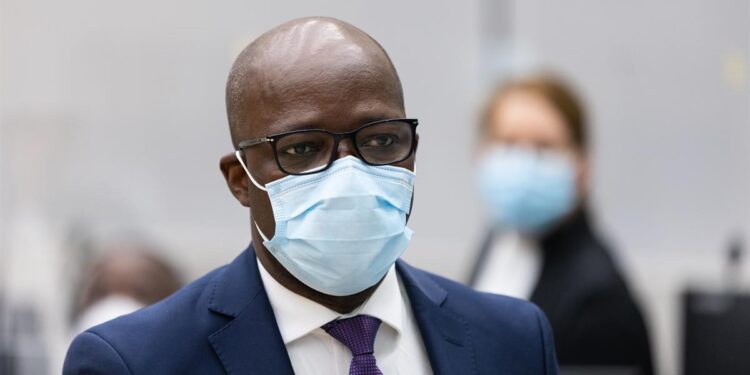Ivorian Charles Blé Goudé is the latest former defendant to have his compensation and damages claim rejected by the International Criminal Court (ICC).
The judges dismissed his allegations of wrongful prosecution “amounting to grave and manifest miscarriage of justice” in a case in which he had been accused of crimes against humanity allegedly committed in Ivory Coast in 2010 and 2011, and for which he was acquitted.
“As the chamber finds that the prosecution’s actions do not rise to the level of a wrongful prosecution, and no other form of a grave and manifest miscarriage of justice has been shown to have taken place, the chamber does not need to move to the second part of the… ‘two-fold approach’; namely, to consider whether it ought to use its discretion to compensate the applicant,” Judge Reine Alapini-Gansou, (presiding) Judge Joanna Korner, and Judge Sergio Gerardo Ugalde Godínez said in their ruling of February 10, 2022.
Blé Goudé, who accused the prosecution of failing to exercise due diligence in investigating and prosecuting him, and throughout his case, thus resulting in his wrongful prosecution, had filed his request on September 14, 2021, under Article 85 of the Rome Statute, requesting compensation for having been subjected to a total of 2,731 days of detention, “house arrest”, and restrictions while still being forced to remain in The Hague.
He had claimed 819,300 euros due to the “serious impact on his personal and professional life” and for wrongful detention in the host state, the Netherlands. Alternatively, he wanted the court to award him 381,900 euros for 1,273 days of miscarriage of justice that he claimed took place on March 19, 2018, when the prosecution submitted its trial brief in which it did not re-evaluate its case against him.
He presented his claim after Trial Chamber I, by majority, acquitted him and his co-accused, Laurent Gbagbo, a former president of Ivory Coast, of all the charges on January 15, 2019, based on their defence counsel’s “no case to answer” motion filed on August 3, 2018. The Appeals Chamber confirmed the decision to acquit on March 31, 2021, and revoked all the conditions the court had set on his release.
The Article 85 Chamber judges noted that an acquittal does not necessarily indicate wrongdoing on the part of the prosecution. Explaining that according to Article 85 of the Rome Statute, the court may award compensation “in exceptional circumstances, where the court finds conclusive facts showing that there has been a grave and manifest miscarriage of justice”, they said the article should not be interpreted as a right to compensation for all acquitted cases.
On the applicant’s claim of the prosecution’s wrongdoing in the course of his case, the chamber said: “At each stage of the proceedings a chamber had oversight over the process and the actions of the prosecution were scrutinised. The fair trial rights of Blé Goudé were thus safeguarded during the criminal proceedings against, rather than impeded upon,” they said.
The judges took note of the conditions the applicant was subjected to after his acquittal, which do not allow him to return to Ivory Coast. However, they said they should not be attributed to the prosecution or the court, and that they were beyond the control of the court. They commended the Registry for its efforts to alleviate Blé Goudé’s situation “at a considerable cost to the court, including by facilitating visits from his family members”. They also asked the Registry to intensify its efforts to persuade Ivory Coast to issue a passport to Blé Goudé to allow him to return home, and to explore with the Netherlands authorities ways to lift some or all the measures they have imposed on him.
The chamber held a hearing on the matter on December 16, 2021 and received further written submissions by Blé Goudé’s legal counsel, Geert-Jan Alexander Knoops and Claver N’dry .
The ICC has rejected three other compensation requests – by former Congolese militia leader Mathieu Ngudjolo in August 2015; by Jean-Jacques Mangenda Kabongo, a former case manager for Jean-Pierre Bemba in April 2015; and by Bemba himself, whose claim failed in May 2019.
Blé Goudé was surrendered to the ICC on March 22, 2014 and held at the Detention Centre in The Hague after his arrest in Ghana on January 17, 2013. The court had on December 21, 2011 issued a warrant for his arrest. He was charged with bearing individual criminal responsibility, as an indirect co-perpetrator, for four counts of crimes against humanity, namely murder; rape and other forms of sexual violence; persecution; and other inhuman acts, allegedly committed in the territory of Ivory Coast between December 16, 2010 and April 12, 2011.
Ivory Coast was plunged into violence after Gbagbo refused to accept defeat in the 2010 presidential elections. The ensuing conflict claimed more than 3,000 lives. More than 200,000 people fled the country.
The arrest warrant against Blé Goudé was one of three that the ICC issued in the context of its investigation in Ivory Coast. The other two were for Laurent and Simone Gbagbo.







